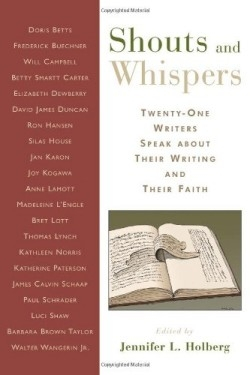Shouts and Whispers
Twenty-One Writers Speak about Their Writing and Their Faith
Flannery O’Connor once remarked, “it makes a great deal of difference to the look of a novel whether its author believes that the world came late into being and continues to come by a creative act of God.”
Since 1990, writers have come to Calvin College every two years for the Festival of Faith and Writing, at which they ponder the relationship between fiction and faith. The editor, associate professor of English at Calvin and director of the Festival, gathers in this splendid collection essays by writers who talk candidly about their own struggles to connect religion and writing. In these twenty-two pieces, writers as diverse as Elizabeth Dewberry, Bret Lott, Will Campbell, Walter Wangerin, Jr., Kathleen Norris, and Jan Karon discuss their discoveries of the ways that faith and fiction intersect in writing.
Acclaimed Young Adult author Katherine Paterson (The Great Gilly Hopkins) wonders, “Is fiction possible where there is no fall? Isn’t it the broken image, the damaged image of God in humankind, that is the stuff of fiction?” Paterson accurately likens writers to gods who must, like God, create a universe that allows for the possibilities of both good and evil. For many writers exploring the intersections between religion and literature, the story of the Fall (Genesis 2-3) serves as a foundational story for all fiction and as a metaphor for the relationship between the artist and her work.
According to Bret Lott (Jewel), all fiction is incarnational. He posits that the Gospel stories about a divinity taking on human form provide the contours for other fictional narratives: “Christ’s insertion into history combined once and for all story and logic, imagination and reason.”
Novelist Elizabeth Dewberry (His Lovely Wife) beautifully sums up the relationship between faith and fiction, and offers advice to writers. Using Jesus’ commandment to love God with heart, soul, and mind, she describes writing as an act of worship: “Write with all your heart, from the depths of compassion and empathy that you can find for your characters. Write with all your mind: pay attention to structure and story and detail and craft. Write with all your soul: the place where God dwells and that therefore connects you, through him, to every other person in the history of this planet.” She continues, “I believe that through fiction, through words, we can transcend the limits of our own individual existences and connect in profound ways, to each other, to the universe, to God. That is what makes words holy.”
This marvelous collection of reflections on religion and the writing life is an essential tool for understanding the ways that faith and fiction are inextricably bound.
Disclosure: This article is not an endorsement, but a review. The publisher of this book provided free copies of the book to have their book reviewed by a professional reviewer. No fee was paid by the publisher for this review. Foreword Reviews only recommends books that we love. Foreword Magazine, Inc. is disclosing this in accordance with the Federal Trade Commission’s 16 CFR, Part 255.

